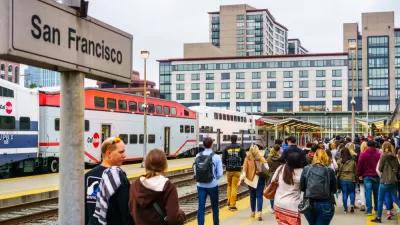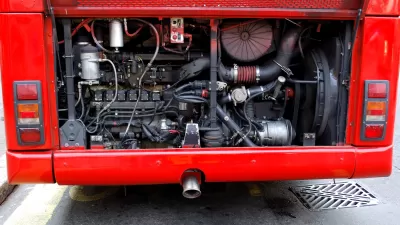Urban Engines uses real-time transit data, and raffles, to encourage transit riders to commute during non-peak hours.
Urban Engines, a startup run by Shiva Shivakumar and Balaji Prabhakar, is using 'crowd-sensing' real-time transit data and financial incentives to draw transit commuters away from peak hour traffic.
According to Eric Jaffe, Urban Engines' use of real-time data allows them to "produce interactive data visualizations that give short-term congestion insights (this platform is overcrowded, trains on this line are bunching) and longer-term traffic trends (on rainy days this station needs more cars). Transit operators can use that information to scheduled and dispatch train supply more efficiently."
Urban Engines' model of financially incentivizing off-peak commutes has already proven successful in three cities (Bangalore, Singapore, and Palo Alto). Per Jaffe, during a six month pilot study in Bangalore, "[roughly] 14,000 locals were given the chance to commute outside peak hours; every time they did, they improved their odds of winning a weekly raffle that paid out prizes ranging from $10 to $240. Over the course of the pilot, commuter traveling pre-rush hour doubled, and the average morning commute time of all bus riders fell from 71 to 54 minutes."
As Jaffe points out, Urban Engines' model has not been applied to drivers nor does it address "the generally entrenched nature of commute habits." And, while Urban Engines' real-time model helps identify system needs, it does not deal with systemic issues within transit agencies such as "limited equipment and personnel" to respond to such needs.
FULL STORY: Using Insights and Incentives to End Rush Hour

Planetizen Federal Action Tracker
A weekly monitor of how Trump’s orders and actions are impacting planners and planning in America.

Restaurant Patios Were a Pandemic Win — Why Were They so Hard to Keep?
Social distancing requirements and changes in travel patterns prompted cities to pilot new uses for street and sidewalk space. Then it got complicated.

Map: Where Senate Republicans Want to Sell Your Public Lands
For public land advocates, the Senate Republicans’ proposal to sell millions of acres of public land in the West is “the biggest fight of their careers.”

Maui's Vacation Rental Debate Turns Ugly
Verbal attacks, misinformation campaigns and fistfights plague a high-stakes debate to convert thousands of vacation rentals into long-term housing.

San Francisco Suspends Traffic Calming Amidst Record Deaths
Citing “a challenging fiscal landscape,” the city will cease the program on the heels of 42 traffic deaths, including 24 pedestrians.

California Homeless Arrests, Citations Spike After Ruling
An investigation reveals that anti-homeless actions increased up to 500% after Grants Pass v. Johnson — even in cities claiming no policy change.
Urban Design for Planners 1: Software Tools
This six-course series explores essential urban design concepts using open source software and equips planners with the tools they need to participate fully in the urban design process.
Planning for Universal Design
Learn the tools for implementing Universal Design in planning regulations.
Heyer Gruel & Associates PA
JM Goldson LLC
Custer County Colorado
City of Camden Redevelopment Agency
City of Astoria
Transportation Research & Education Center (TREC) at Portland State University
Camden Redevelopment Agency
City of Claremont
Municipality of Princeton (NJ)




























